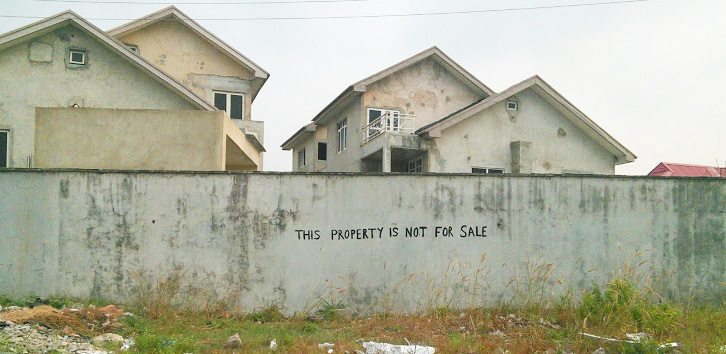Look at the picture below carefully and read the sign there. You’ll see one of the ins-and-outs of real estate in Nigeria – and I suspect that similar ones may appear in the rest of Africa:

Yes, you got it right!: “This property is NOT for sale.” Unusual, isn’t it? Not so here, where you can see similar signs here and there. Real estate is one of the sectors to watch in Nigeria:only in Lagos, the housing deficit is of about 3 M units, with a forecast of land scarcity in 20 years. An attractive industry, but one that requires a lot of local knowledge to succeed in it.
General ‘Tunde Reis – a successful entrepreneur in the industry, and founder of First World Communities Ltd – shared with me some of those ins-and-outs:
- Some land is owned by the government: They acquired it (i.e., expropriated it) from the so called “customary land owners.” The tricky issue is that many times these families still occupy it, and claim that the land is theirs. The end result is that it’s common business practice that you pay twice: both to the government, and to the occupiers.
- Other land is in private hands (the “customary land owners”): Serious real estate developers like First World Communities Ltd do not buy from them. Because there is no central ownership registration system, you can’t be sure who the land belongs to and different people may claim ownership.
- The social conception is that a house belongs to the family: When someone buys a house, the extended family members contribute to it (this speaks to the Africans’ communal mentality I referred to in a previous post). The implication is that if you know how to manage this, you can design your financing options in such a way that you can sell houses to people who would not qualify for a mortgage.
If you combine the lack of information about property titles with the sense of “shared property” that derives from the extended family contributions to finance the acquisition of a house, the end result is the picture above. It just happens that people may be selling a house or a land property they do not own; they may either be falsifying the ownership titles, or they may just be convinced that the property is theirs. It’s not uncommon that two family members are trying to sell a house to different people without letting each other know. And the house may be shown to a potential buyer in the absence of the inhabitants. Thus, you need to make it public if “this property is NOT for sale.”

To the contrary, ownership of government land is properly registered, including who the legal “customary land owners” are. Guaranteeing that only this land is acquired grants a company like First World Communities Ltd a reputation for reliability — something particularly important in this industry, as you probably have figured out. (And by the way, First World Communities Ltd is one of those companies that plans to become Pan-African in the medium term.)
Have you seen a system similar to this one anywhere else?


Think global and act local. How important it is to know the local markets deeply. Thanks for the insight Africa!
Very true, Patricia: I think that for someone to succeed in the real estate industry this local knowledge is critical. The Managing Director of another real estate company in Lagos explained to me how important it is to count with reliable agents to acquire the land. If a foreign company is planning to enter, they reather look for a local partner that Knows all of the ins-and-outs!
It’s a very awkward system (from my perspective). I am curious about how the Nigerian tax system on property works. In Spain at least, the government is taxing any apartment on a yearly basis. They charge the owner an amount of money depending upon the value of the land which is more expensive in Madrid and Barcelona than in the rest of Spain. Even in a city like Barcelona certain neighbourhoods are more expensive than others and pay more taxes. I have always thought of this tax system as a source of money for the government but now I also see it as a confirmation of who the owner is (the one who is asked to pay it by the government and who actually pays the taxes). This implies a central registered system. In the absence of this central system. How do you tax on property?
The communal mentality which is good for the society in many aspects has some downsides I am afraid.
Lourdes
Lourdes, I agree that this is, at least, unconventional… I don’t know how the property tax system works here. I’ll try to find out, and will let you know if I do. Your comment made me think that the lack of a central registration system may have to do with the lack of incentives for the Government to collect taxes — as they live from what they collect from the oil industry which covers about 70 % of the public budget — and therefore to provide the insfrastructures and the institutions needed for economic activity to florish. I discussed some related issues on an earlier post on the impoverishment of Nigeria in the post-colonial time: https://blog.iese.edu/africa/2014/02/17/nigerias-development/